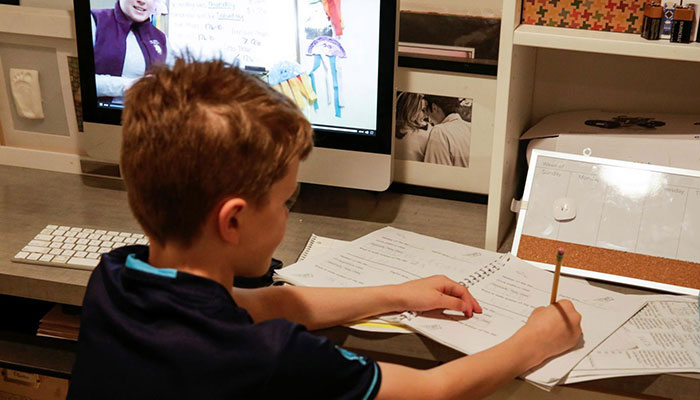Lack of access to internet affecting education in pandemic times, say academics
By providing access to live and recorded lectures to students through the internet, the Higher Education Commission (HEC) managed to keep the educational system running during the Covid-19 pandemic.
An HEC representative said this on Friday during the an international virtual conference, titled ‘Diversity, Inclusion and Equity: Synergies and challenges in the wake of Covid-19’, organised by the Ziauddin University’s (ZU) faculty of liberal arts and human sciences in collaboration with the National Academy of Higher Education, HEC, Islamabad.
“Despite facilitating students and teachers in the area of online education system, we have received complaints from the students of remote areas that they do not have internet access to continue their online education. HEC has taken notice of all the complaints on an urgent basis and we are working on this issue,” said Prof Dr Shaheen Sardar, the National Academy of Higher Education rector as he addressed the two-day conference in Karachi.
The conference was broadcast live on the ZU's Facebook page. Prof Shaheen presented her research paper about the responses to the Covid-19 pandemic in the higher education sector. She critically analysed the challenges as well as the opportunities generated by the pandemic. On the positive aspects, the paper argued that in addition to substantive content on teaching and learning, research and academic governance, the transformation to online delivery forced new skills and competencies upon the participants.
The paper also highlighted the lack of any coherent policy addressing the gender issues in the work from home policy. The paper raised the issue of how the Covid-19 pandemic had increased the gap between those with the access to the internet and those deprived of it. ZU Pro Chancellor Dr Nida Hussain emphasised that the varsity was committed to authentic and multidisciplinary research and its efficient mobilisation to benefit society as a whole. “I am confident that this conference will pave the way for similar debates and dialogue among representatives of key sectors in academia.”
Idara-e-Taleem-o-Aagahi (ITA) Chief Executive Officer Baela Raza Jamil said the Covid-19 pandemic has been an unprecedented global emergency, affecting every single field of life including education services. “The pandemic has pushed state and non-state educators to redesign learning actions and platforms through blended approaches of face-to-face and distance digital solutions, more holistic, accelerated, cost-effective and human above all,” she remarked.
Prof Dr Frances Schoonmaker, Professor Emerita Teachers College, Columbia University, United States, spoke about ‘rethinking access and equity in education’. She said educators would not be able to erase the self-perpetuating effects of inequity, lack of access to education services and racial injustice until they found ways of addressing the cultural myths embedded in our various personal and national histories.
She advised the conference participants to examine their own histories and trace the emergence of discriminatory practices toward women and minorities that were passed on to teachers.
In his welcome address, ZU Vice Chancellor Prof Dr Pirzada Qasim Raza Siddiqui said all the participants had come together to address the challenges posed by Covid-19 and build on the synergies built during these trying times to make the world a better place to live in.
Discussing the conference highlights, Conference Chair Prof Dr Fauzia Shamim said Covid-19 brought for everyone the urgent need for access to digital resources and literacy to use those resources. She added that in the process, it had brought to the fore the issues of access and equity in the education and health sectors.
-
 Savannah Guthrie Sends Desperate Plea To Mom Nancy Kidnapper
Savannah Guthrie Sends Desperate Plea To Mom Nancy Kidnapper -
 NBA All-Star 2026 Shake-up: Inside The New USA Vs World Tournament Format
NBA All-Star 2026 Shake-up: Inside The New USA Vs World Tournament Format -
 Warner Bros Consider Reopening Deal Talks With Paramount, Says Reports
Warner Bros Consider Reopening Deal Talks With Paramount, Says Reports -
 Andrew Mountbatten Windsor Faces Future With UK MPs, Says Expert
Andrew Mountbatten Windsor Faces Future With UK MPs, Says Expert -
 Shamed Andrew Told 'nobody Is Above The Law' Amid Harrowing Silence
Shamed Andrew Told 'nobody Is Above The Law' Amid Harrowing Silence -
 Gisele Bundchen Melts Hearts With Sweet Bike Ride Glimpse Featuring Son
Gisele Bundchen Melts Hearts With Sweet Bike Ride Glimpse Featuring Son -
 Prince William Found Meghan Markle ‘quite Refreshing’ At Start
Prince William Found Meghan Markle ‘quite Refreshing’ At Start -
 Kate Middleton Knew Should Could Not Be ‘voice Of Reason’ With Prince Harry
Kate Middleton Knew Should Could Not Be ‘voice Of Reason’ With Prince Harry -
 Rihanna Has Wardrobe Malfunction At A$AP Rocky Fashion Show
Rihanna Has Wardrobe Malfunction At A$AP Rocky Fashion Show -
 Prince Harry Felt System Had ‘one Rule For Him, One For Prince William’
Prince Harry Felt System Had ‘one Rule For Him, One For Prince William’ -
 Jake Paul's Fiancée Sends Him Over The Moon Over Stunning Victory
Jake Paul's Fiancée Sends Him Over The Moon Over Stunning Victory -
 Harper Beckham Sends Valentine’s Love Amid Brooklyn Family Drama
Harper Beckham Sends Valentine’s Love Amid Brooklyn Family Drama -
 Why Prince William, Kate Middleton 'partnership' Is Important For Monarchy
Why Prince William, Kate Middleton 'partnership' Is Important For Monarchy -
 Katie Price Drama Escalates As Family Stays In Touch With Ex JJ Slater
Katie Price Drama Escalates As Family Stays In Touch With Ex JJ Slater -
 Critics Target Palace Narrative After Andrew's Controversy Refuses To Die
Critics Target Palace Narrative After Andrew's Controversy Refuses To Die -
 Sarah Ferguson’s Delusions Take A Turn For The Worse: ‘She’s Been Deserted’
Sarah Ferguson’s Delusions Take A Turn For The Worse: ‘She’s Been Deserted’




